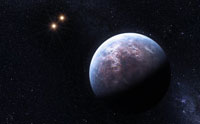Europeans Astronomers Find 32 New Planets Outside Solar System
European astronomers have found 32 new planets outside our solar system, adding evidence to the theory that the universe has many places where life could develop. Scientists using the European Southern Observatory telescope didn't find any planets quite the size of Earth or any that seemed habitable or even unusual. But their announcement increased the number of planets discovered outside the solar system to more than 400.

Six of the newly found planets are several times bigger than Earth, increasing the population of so-called super-Earths by more than 30 percent. Most planets discovered so far are far bigger, Jupiter-sized or even larger.
Two of the newly discovered planets were as small as five times the size of Earth and one was up to five times larger than Jupiter , The Associated Press reports.
Since lower masses most likely mean Earthlike sizes, such planets are considered to be the best candidates in the search for extraterrestrial life.
"The models are predicting even larger numbers of low-mass planets like Earth, so I am pretty confident that there are Earth-type planets everywhere," said team member Stephane Udry of the Observatory of Geneva in Switzerland.
"Nature doesn't like a vacuum," he added, "so if there is space to put a planet, it will put the planet there," National Geographic News reports.
In the past five years, the High Accuracy Radial Velocity Planet Searcher, a special exoplanet-hunting device attached to a 3.6-meter telescope in La Silla, Chile, has spotted more than 75 alien planets, including 24 of the 28 known exoplanets with a mass less than 20 times that of Earth.
Given the high frequency of low-mass planets discovered by HARPS, the researchers think between 39 and 58 percent of solar-type stars host a planet with a mass of less than 50 Earth-masses.
"These findings consolidate the results of simulations of planet formation predicting a large population of super-Earths,” astrophysicist Stephane Udry of Geneva University wrote in an email to Wired.com.
"The formation models furthermore predict an even larger population of Earth-mass planets, providing solid scientific justifications for the development of ambitious programs (in space and on the ground) to look for those Earth-type planets," Wired News reports.
Subscribe to Pravda.Ru Telegram channel, Facebook, RSS!





